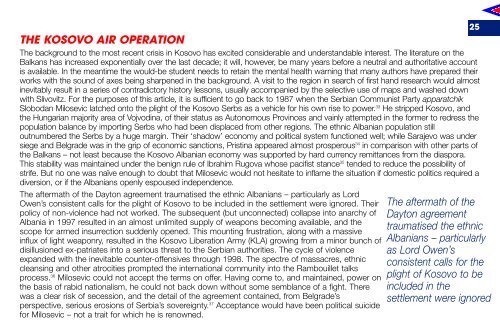THE RAF AIR POWER REVIEW - Royal Air Force Centre for Air ...
THE RAF AIR POWER REVIEW - Royal Air Force Centre for Air ...
THE RAF AIR POWER REVIEW - Royal Air Force Centre for Air ...
Create successful ePaper yourself
Turn your PDF publications into a flip-book with our unique Google optimized e-Paper software.
<strong>THE</strong> KOSOVO <strong>AIR</strong> OPERATION<br />
The background to the most recent crisis in Kosovo has excited considerable and understandable interest. The literature on the<br />
Balkans has increased exponentially over the last decade; it will, however, be many years be<strong>for</strong>e a neutral and authoritative account<br />
is available. In the meantime the would-be student needs to retain the mental health warning that many authors have prepared their<br />
works with the sound of axes being sharpened in the background. A visit to the region in search of first hand research would almost<br />
inevitably result in a series of contradictory history lessons, usually accompanied by the selective use of maps and washed down<br />
with Slivovitz. For the purposes of this article, it is sufficient to go back to 1987 when the Serbian Communist Party apparatchik<br />
Slobodan Milosevic latched onto the plight of the Kosovo Serbs as a vehicle <strong>for</strong> his own rise to power. 33 He stripped Kosovo, and<br />
the Hungarian majority area of Vojvodina, of their status as Autonomous Provinces and vainly attempted in the <strong>for</strong>mer to redress the<br />
population balance by importing Serbs who had been displaced from other regions. The ethnic Albanian population still<br />
outnumbered the Serbs by a huge margin. Their ‘shadow’ economy and political system functioned well; while Sarajevo was under<br />
siege and Belgrade was in the grip of economic sanctions, Pristina appeared almost prosperous 34 in comparison with other parts of<br />
the Balkans – not least because the Kosovo Albanian economy was supported by hard currency remittances from the diaspora.<br />
This stability was maintained under the benign rule of Ibrahim Rugova whose pacifist stance 35 tended to reduce the possibility of<br />
strife. But no one was naïve enough to doubt that Milosevic would not hesitate to inflame the situation if domestic politics required a<br />
diversion, or if the Albanians openly espoused independence.<br />
The aftermath of the Dayton agreement traumatised the ethnic Albanians – particularly as Lord<br />
Owen’s consistent calls <strong>for</strong> the plight of Kosovo to be included in the settlement were ignored. Their<br />
policy of non-violence had not worked. The subsequent (but unconnected) collapse into anarchy of<br />
Albania in 1997 resulted in an almost unlimited supply of weapons becoming available, and the<br />
scope <strong>for</strong> armed insurrection suddenly opened. This mounting frustration, along with a massive<br />
influx of light weaponry, resulted in the Kosovo Liberation Army (KLA) growing from a minor bunch of<br />
disillusioned ex-patriates into a serious threat to the Serbian authorities. The cycle of violence<br />
expanded with the inevitable counter-offensives through 1998. The spectre of massacres, ethnic<br />
cleansing and other atrocities prompted the international community into the Rambouillet talks<br />
process. 36 Milosevic could not accept the terms on offer. Having come to, and maintained, power on<br />
the basis of rabid nationalism, he could not back down without some semblance of a fight. There<br />
was a clear risk of secession, and the detail of the agreement contained, from Belgrade’s<br />
perspective, serious erosions of Serbia’s sovereignty. 37 Acceptance would have been political suicide<br />
<strong>for</strong> Milosevic – not a trait <strong>for</strong> which he is renowned.<br />
25<br />
The aftermath of the<br />
Dayton agreement<br />
traumatised the ethnic<br />
Albanians – particularly<br />
as Lord Owen’s<br />
consistent calls <strong>for</strong> the<br />
plight of Kosovo to be<br />
included in the<br />
settlement were ignored

















